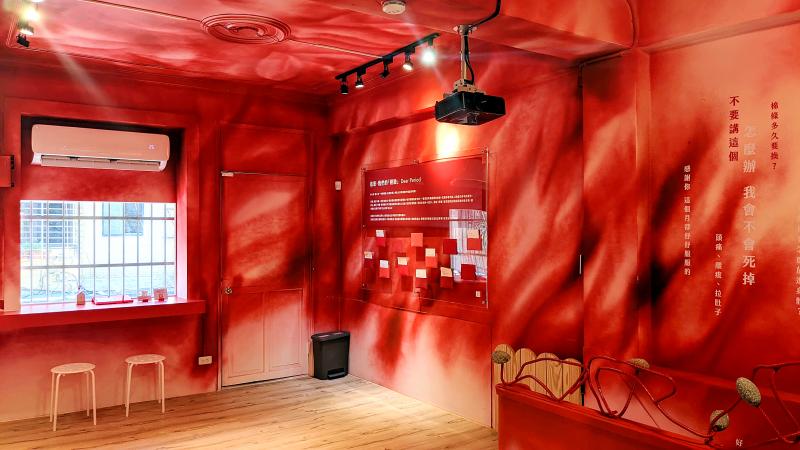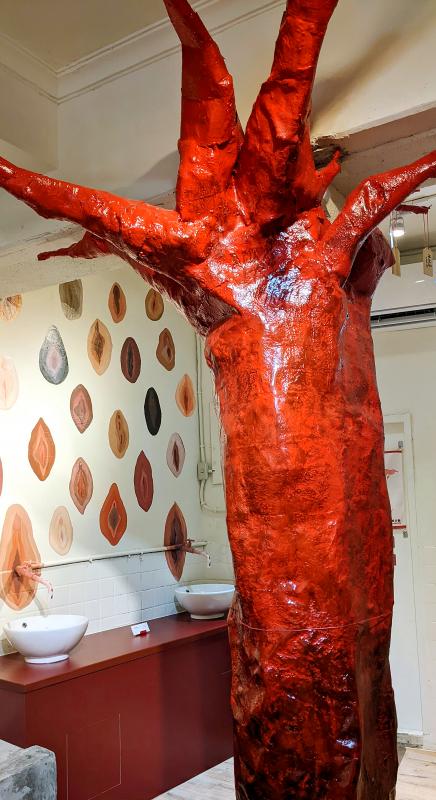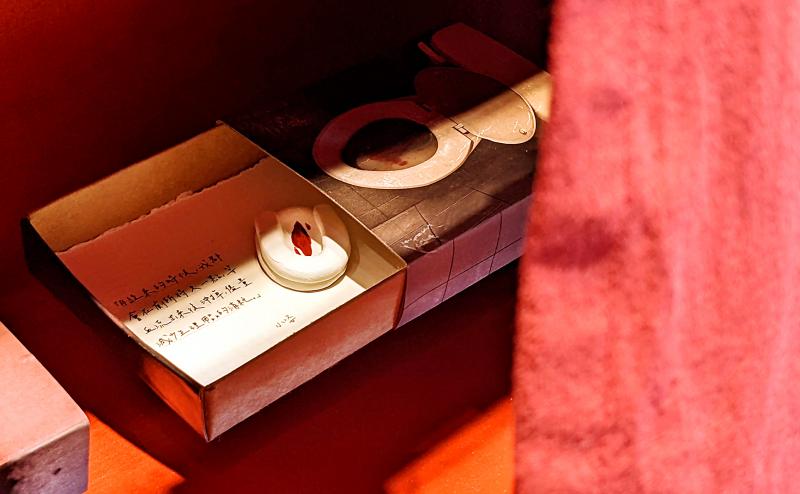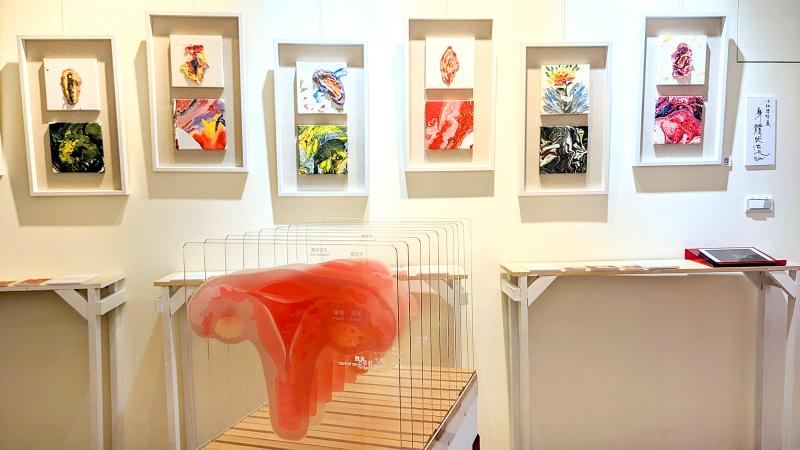Women in Taiwan often say “my aunt is visiting” (大姨媽來了) or “my ‘that’ is here” (那個來) when their menstrual cycle arrives — but there are no euphemisms to describe it at the Red House Period Museum (小紅厝月經博物館), which opened on Thursday.
“Due to a lack of understanding, fear of blood and various taboos, the period has historically and globally been something that cannot be discussed publicly,” a display on period stigma at the museum states. “Or, it is replaced by all sorts of indirection.”
The museum estimates that there are more than 30 such terms in Taiwan to describe that time of month, related phenomena and items such as menstrual pads. Taiwan is not alone: there are over 5,000 terms used across the world to avoid saying the actual word.

Photo: Han Cheung, Taipei Times
Located on a market street in Taipei’s Datong District (大同) frequented by the elderly, the museum’s bright red facade stands out — especially the statue of a smiling, anthropomorphic drop of blood sitting on a bench. Once inside, visitors encounter a large, bright-red tree and a wall of vaginas.
Anatomy lessons, art displays, personal stories and period-related products, the museum has been three years in the making by With Red (小紅帽), a nonprofit organization dedicated to eliminating period poverty, period inequality and period stigma. In addition to the museum, the organization has an ongoing exhibition at the Taiwan Women’s Center (國家婦女館) with period-related stories they’ve collected from four generations of Taiwanese women.
“Periods are the elephant in the room,” founder Vivi Lin (林薇) says in a video at the museum. “It’s obviously there, but we don’t see it. But when we create a physical space in this city … that’s immediately noticeable, people can’t ignore it anymore.”

Photo: Han Cheung, Taipei Times
The first part, which explains how the uterus and menstrual cycle works, leans toward the cutesy side with displays that look like they come from children’s sex-ed textbooks. The treatment works in this case as it eases the viewers in, and despite the light-hearted tone, the anatomical information is detailed and clear.
ART INSPIRED BY THE PERIOD
The other side of the wall is dedicated to period-inspired art. Interestingly, the inaugural exhibition, Flow (身體伏流), includes pieces by male artists. This makes sense as much of the stigma is caused by traditional patriarchal attitudes. Many men are ashamed to buy menstrual hygiene products for their loved ones, or think that female colleagues who take time off due to menstrual discomfort are lazy.

Photo: Han Cheung, Taipei Times
Of note is the mini gift shop with stickers, earrings, shirts, trinkets and even sanitary pad and moon cup-shaped tea bags, all created by With Red. What better way to remove stigma than to make the period fashionable?
Covered from ground to ceiling in a stylish bright red paint, the second floor deals with more serious issues through personal testimonies.
Some are quite eye-opening. One woman details how her mom forbade her from touching houseplants during her period as she believed that it would kill them. Another tells of a female teacher, who would put her hand into the underwear of a student after she requested time off due to her period. The teacher wanted proof that the student was “bleeding.” After this policy caused a stir, the school had each student submit their period cycle to the male swimming teacher, who ignored the fact that periods could be irregular.

Photo: Han Cheung, Taipei Times
PERIOD POVERTY
Period poverty is also a subtheme, a topic people rarely broach. About 9 percent of women in Taiwan struggle to purchase sanitary products. Several artworks with personal stories illustrate the hardships they endure — skipping meals to save money or sitting on the toilet to let the blood drip to conserve pads.
This exhibition continues the work that With Red has been doing over the past few years, and will definitely raise awareness and provoke discussion about menstruation. It would be great if the displays and stories could be translated into English, however, something the staff say they are planning to do in the future.

A vaccine to fight dementia? It turns out there may already be one — shots that prevent painful shingles also appear to protect aging brains. A new study found shingles vaccination cut older adults’ risk of developing dementia over the next seven years by 20 percent. The research, published Wednesday in the journal Nature, is part of growing understanding about how many factors influence brain health as we age — and what we can do about it. “It’s a very robust finding,” said lead researcher Pascal Geldsetzer of Stanford University. And “women seem to benefit more,” important as they’re at higher risk of

Eric Finkelstein is a world record junkie. The American’s Guinness World Records include the largest flag mosaic made from table tennis balls, the longest table tennis serve and eating at the most Michelin-starred restaurants in 24 hours in New York. Many would probably share the opinion of Finkelstein’s sister when talking about his records: “You’re a lunatic.” But that’s not stopping him from his next big feat, and this time he is teaming up with his wife, Taiwanese native Jackie Cheng (鄭佳祺): visit and purchase a

April 7 to April 13 After spending over two years with the Republic of China (ROC) Army, A-Mei (阿美) boarded a ship in April 1947 bound for Taiwan. But instead of walking on board with his comrades, his roughly 5-tonne body was lifted using a cargo net. He wasn’t the only elephant; A-Lan (阿蘭) and A-Pei (阿沛) were also on board. The trio had been through hell since they’d been captured by the Japanese Army in Myanmar to transport supplies during World War II. The pachyderms were seized by the ROC New 1st Army’s 30th Division in January 1945, serving

The People’s Republic of China (PRC) last week offered us a glimpse of the violence it plans against Taiwan, with two days of blockade drills conducted around the nation and live-fire exercises not far away in the East China Sea. The PRC said it had practiced hitting “simulated targets of key ports and energy facilities.” Taiwan confirmed on Thursday that PRC Coast Guard ships were directed by the its Eastern Theater Command, meaning that they are assumed to be military assets in a confrontation. Because of this, the number of assets available to the PRC navy is far, far bigger